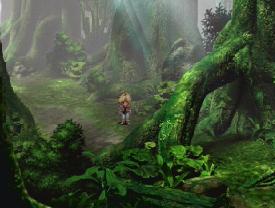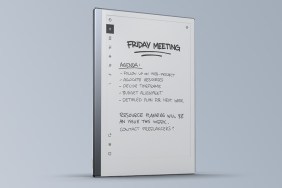Living the life…
It would be great to live in a RPG. Everyday I’d be on some “hero’s journey”
– falling in love, collecting money from slain enemies, saving the world, and
stealing from the local villagers. Normally, you would think that in order to
keep something safe, the best place to keep it would be in a safe or a chest.
Well, that just makes it easier for me to steal. And if they don’t like it,
I just won’t save their world. Take that, ungrateful townfolk!
Of course, I would never
do that in real life, as I wouldn’t be able to handle the prison time. So, playing
RPG’s like Star Ocean will have to do.
Star Ocean is a multi-tiered game. You experience the story through
one of two characters: Claude or Rena. Through an intervention of fate, these
two cross paths to set the stage for the story.
Claude is the son of Ronixis Kenni, a famous admiral. On an exploration mission,
Claude accidentally activates a portal that transports him to another world.
This other world is Rena’s homeworld. She’s an orphan with strange healing powers,
trying to find the truth about her past. In this world, the presence of evil
has grown, and it becomes your task to find out what’s behind it.
For those wondering why it’s Star Ocean The Second Story, here’s
the deal. Ronixis was the hero of the first Star Ocean game released
on the Super Famicom in Japan, but not in America. While there are references
to the first game, it isn’t that important.
When you begin, your immediate goals are unclear. There are plenty of deviants
and tangents to your quest. Options arise that let you choose to accomplish
other things, like recruiting new members to your party or perform “Dragon exorcism"
(you’ll see…).
The story starts out great, but it begins to fizzle out after the second disk,
focusing less on character development and more on generic RPG archetypes. The
clearest sign of the game losing its cohesiveness is the lengthy plot synopsis
right when you get to the second disk. From there, your objectives proceed more
linearly.
Before you begin the game, you have your choice of three play modes: turn-based,
real-time action, or a mix of the two. Having tried them all, I suggest going
for real time. It’s a good change of pace from the traditional turn based affair,
with a style somewhat close to The Secret of Manna. Once battle starts,
you control one character out of your party. You can then freely move around
the battle plane, using either a basic or stronger attack. There are also spells
at your disposal, but unless the character is a strong magic user, it’s easier
to whittle the enemy down with the weak attacks.
The other members of your party are computer controlled, but you can switch
to them or set them to fight a certain way. In some of the early action scenes,
you can simply switch to Rena (the consummate healer of this RPG) and simply
have her heal up the other characters, letting the computer control the dirty
work. Later on, it takes more skill and level building to get through battles.
There also some pre-battle strategy, such as spells to set and formations to
plan. Once you have it down, it’s a lot of fun.
Unique to this game is the Private Action command. At certain times when you
approach a city, you can select to split off as individual members. Then, depending
on whether you chose Rena or Claude, you proceed to wander the city by yourself.
Sometimes you get to talk one on one with another member of your party. Sometimes
there’s some mini-task for you to accomplish. The strength of this feature is
that it allows for character development that would seem too muddled if you
were still playing as a big group. It’s also the factor that determines how
many of the 80 possibles endings will show up at the end. The only awkward
part to this is having to exit and re-enter the cities in order to bring your
party back together.
 The backgrounds in Star
The backgrounds in Star
Ocean are stunningly beautiful, bringing back memories of an age before
polygons. The overworld map is polygonal and looks out of place in contrast
to these backgrounds. Character designs are well done; each character’s personality
resonates in their drawn images. Unfortunately, your character appears too damn
small. While it does have that 8 bit charm, it’s a bit cheesy in this day and
age. I’d like to see the character take up fat screen space.
Another gripe is the tendency to reuse graphics. Hotel rooms and castle staircases
(among others things) all look the same. The number of general character images
also seems somewhat limited. At one point, you find yourself on another planet.
Yet this “other” planet has the same familiar enemies but with a different color
scheme. Ooohh, fancy.
The animated cut scenes feel lifeless. While it works in the opening, the
other FMVs look dead. When an eathquake and a tsunami are going to destroy a
town, I want to see little anime characters running in abject terror, wetting
their pants, and screaming for their lives. All I got were buildings tumbling
down.
I haven’t heard music that I’ve liked this much in a long time. Most of the
Village themes have this great ballad quality to them. In moments where the
music needs to establish the drama, the game delivers. However, the battle music
falls somewhat short of the other music; it seems too run of the mill, with
a repeated set of tones and beats. And then there are the voices, which are
lousy. I supppose there’s something about mismatched sounds yelled out while
fighting that adds more to the old school charm, but this is pushing it.
Star Ocean looks to be the best of the summer RPGs (among Lunar
and Shadow Madness). While it doesn’t provide the graphical flash of
Final Fantasy 8, it delivers a different graphical beauty that feels
warmer than the all too familiar polygonal experience. It’s got a good story
that sadly weakens at the end; though there’s just enough steam left to get
you through. However, whether you’d want to replay 30-35 hours of it again just
for a slightly different ending scene is doubtful. While not the perfect RPG
I’ve been waiting for, it’s not a bad choice.
-
Beautiful backgrounds
-
Great music
-
First half of the story
-
Second half of the story
-
Tiny character graphics
-
The voices! The voices!










